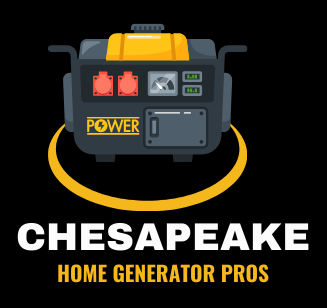
Standby Whole House Generators in Great Bridge VA
Standby whole house generators are essential for maintaining power in your home during outages. Unlike smaller portable generators, they are designed to provide backup electricity for your entire house, ensuring that all your critical systems, appliances, and comfort features remain functional when the power goes out. These generators kick in automatically, so you don’t have to worry about manual start-up or refueling, providing peace of mind and security.
How It Differs from Portable Generators
Standby whole house generators and portable generators serve the same basic function—providing power during an outage—but they differ significantly in scope and convenience.
- Capacity: Whole house generators are much more powerful and can supply electricity to every part of your home, including large appliances like air conditioners and heaters. Portable generators, on the other hand, are typically used for smaller tasks and may only power essential devices.
- Automation: Whole house generators start automatically when the power goes out, providing seamless transition without any manual intervention. Portable generators require manual startup and are less convenient for long-term use.
- Installation: Whole house generators are permanently installed and integrated into your home’s electrical system, while portable generators are usually set up temporarily and require extension cords.
How It Works
Standby whole house generators are connected to your home's electrical system and fuel supply, either natural gas or propane. When a power outage occurs, the generator detects the loss of power through a transfer switch. It automatically starts up, supplying electricity to your home and allowing you to continue using your appliances and systems without interruption. Once the main power is restored, the generator shuts down and switches back to standby mode.

We will get back to you as soon as possible.
Please try again later.
Types of Standby Whole House Generators
There are primarily two types of whole house generators: standby generators and automatic backup generators.
- Standby Generators: These are permanently installed outside your home and are connected to your home's electrical system. They are powered by natural gas or propane and are capable of running your entire home’s electrical system.
- Automatic Backup Generators: Similar to standby generators, these units start automatically when they detect a power outage. They also typically run on natural gas or propane and are designed to provide uninterrupted power.
Key Features to Consider
When choosing a standby whole house generator, consider the following features:
- Power Capacity: Ensure the generator has enough power to handle your home’s needs. This includes all essential systems and appliances.
- Fuel Type: Decide between natural gas, propane, or diesel, depending on availability and your preferences.
- Automatic Transfer Switch: This feature allows the generator to automatically switch on when power is lost and switch off when power is restored.
- Noise Level: Consider the noise output of the generator, especially if you have close neighbors.
- Brand and Warranty: Choose a reputable brand with a good warranty to ensure reliability and support.
Installation Process
The installation of a standby whole house generator involves several steps:
- Site Assessment: A professional will assess your home and determine the best location for the generator, considering factors like proximity to the electrical panel and fuel supply.
- Permits and Codes: Necessary permits must be obtained, and the installation must comply with local building codes.
- Generator Placement: The generator is placed on a stable base, typically a concrete pad, and connected to the fuel supply.
- Electrical Connections: A transfer switch is installed to integrate the generator with your home's electrical system.
- Testing: The system is tested to ensure everything functions correctly and safely.
Maintenance and Care
Proper maintenance ensures the longevity and reliability of your standby whole house generator. Regular tasks include:
- Routine Inspections: Check for any signs of wear or malfunction and ensure the generator is operating smoothly.
- Oil Changes: Follow the manufacturer’s recommendations for oil changes and other routine maintenance tasks.
- Fuel Levels: Regularly check the fuel levels and ensure the fuel supply is adequate.
- Exercise the Generator: Run the generator periodically, even when not in use, to keep it in good working condition.
Initial and Ongoing Costs
The initial cost of a standby whole house generator includes the purchase price, installation, and any necessary permits. These costs can vary based on the generator’s power capacity and installation complexity. Ongoing costs include maintenance, fuel, and potential repairs. Regular maintenance helps prevent costly repairs and ensures the generator remains in good working condition.
The Importance of Backup Power Solutions
Having a reliable backup power solution is crucial for ensuring your home remains functional during power outages. It provides safety, security, and convenience by keeping essential systems operational, such as heating, cooling, and medical equipment. In areas prone to frequent power outages or severe weather, a standby whole house generator is an investment in peace of mind.
What We Offer
At our company, we provide comprehensive standby
whole house generator services in Great Bridge, VA. Our offerings include:
- Residential Generators
- Commercial Generators
- Portable Generators
- Electric Generators
- Propane Generators
- Solar Generators
- Generator Repairs
- Generator Maintenance
- Generator Parts
Ensure your home is prepared for any power outage with a reliable standby whole house generator. Contact us today to learn more about our services, schedule a consultation, or get a quote. We are here to help you safeguard your home and maintain uninterrupted power in Great Bridge, VA.
Let's Connect!
As power outages become increasingly common, having a reliable backup generator can make all the difference. We specialize in providing top-notch generator installation and maintenance services to keep our customers prepared for anything. Whether you're looking for a whole-house generator or a small portable unit, we have the knowledge and expertise to help you choose the right option for your home and budget. Don't let life's unexpected power outages catch you off guard—hire us today and enjoy peace of mind knowing that your home is protected.